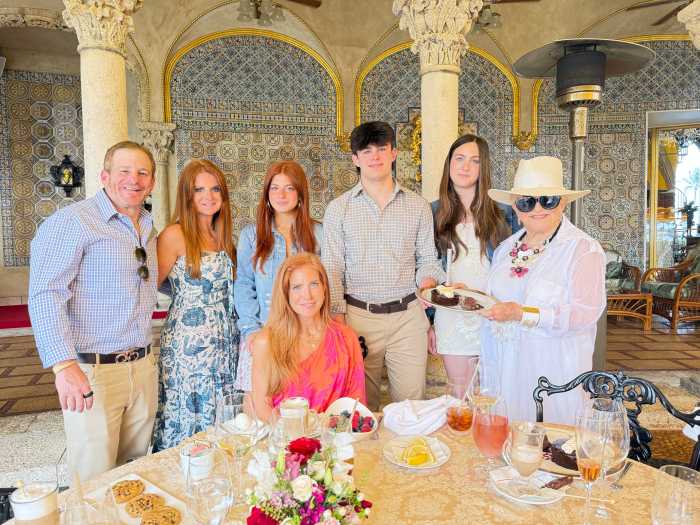By Raphael Sugarman
One thing most puzzled Erica Strauss and her family when she was growing up in their house in Far Rockaway: Wherever did she get such a soaring operatic voice? Strauss's mother Ava conjectured that perhaps her daughter's exquisite tones were inherited from her great grandfather Yehuda, who loved opera and reveled in chanting in the synagogue when he moved to Queens in 1926.But like a lot of talented girls, Erica was more interested in singing Broadway tunes than arias when she was a child.”I used to sing songs from 'Annie' and 'Memories' from 'Cats' in front of the hearth of our family's fireplace,” said Strauss. “When I was a kid, I could belt Broadway songs like nobody's business. There was nothing I enjoyed doing more.”The young singer's repertoire evolved quickly when she reached the ripe old age of 14 and began working with her first voice teacher. The mentor introduced Strauss to “24 Italian Songs and Arias,” the classic training volume for all voice students. Each week, Strauss was assigned one aria from the book, as well as a Broadway tune.Before too long, however, she became more interested in the opera pieces. By the time she saw “The Magic Flute,” her first live opera at the age of 17, Strauss was hooked. Moreover, she had come to realize that her voice was richer, complex, and “more suited to singing opera.””In opera, we are trained to even out our voice,” she said. “One part of the voice is not bigger than the rest of it. With classical training you can maintain the elasticity of your voice.”Strauss, who is debuting at Carnegie Hall his month, has an impressive “Spinto” Soprano voice, capable of singing weighty, rousing climaxes.”My voice is large and is suited for fairly dramatic roles,” said Strauss, who lists Princess Elizabeth from “Don Carlos,” Mimi from “La Boheme,” Violetta from “La Traviata” and Tatiana from “Eugene Onegin,” as roles she craves.Strauss's strong voice extends to her off-stage persona as well. She wishes that more Americans regarded opera the way the Europeans do. “In countries like Germany, Austria and Switzerland, there are opera houses everywhere,” she said. “Too many Americans see opera as elitist.”Opera, Strauss believes, is similar to Broadway in many ways, “It's just theater, it's just having a good time, it's a good story with good music,” she said.Strauss received her voice training at the Mannes College of Music on Manhattan's Upper West Side. She earned both a BM and MM in voice from the Mannes school and was awarded the Marian Marcus Wahl Memorial Award in Performance at its 1999 commencement.She recently graduated the Lyric Opera Center for American Artists, one of the country's most renowned institutions for opera. She made her Lyric Opera of Chicago debut as the Priestess in “Aida” and was also seen as the First Lady in “Die Zauberflšte,” Micaela in “Carmen” and Marianne Leitmetzerin in “Der Rosenkavalier.”Other projects have included playing Mica‘la in “Carmen” with the Northwest Indiana Symphony and performing as a soloist in Beethoven's Symphony No. 9 with the Chicago Philharmonic.She is currently covering of the role of Leonora in Verdi's “Il Trovatore” with the Lyric Opera of Chicago, and was awarded a Marilyn Horne Foundation residency and recital at Oberlin College.Strauss is perhaps most excited about her Carnegie Hall debut this month, as part of the Weill Music Institute's “The Song Continues” at Zankel Hall Jan. 26.The six-event vocal festival, which will run from Jan. 23-26, will include master classes with Horne and other legendary singers Barbara Cook and Evelyn Lear.The final recital, in which Strauss will appear, will feature guest artist Marcello Giordani and include a world premier of songs written by Gabriela Lena Frank. The recital is entitled “Gypsy in My Soul,” and will feature music by Dvorak, Brahms and Rossini.Strauss said she is thrilled about the concert. “I thought this was a wonderful idea the moment I first heard about it,” she said. “All opera singers are gypsies in a way, we are all restless. Any night on the stage we become different people, which is a very exciting thing.”Tickets for “Gypsy in My Soul,” are available at the Carnegie Hall Box Office, 154 West 57th Street. Tickets may also be charged to major credit cards by calling CarnegieCharge at 212-247-7800 or online by visiting www.carnegiehall.org.

































